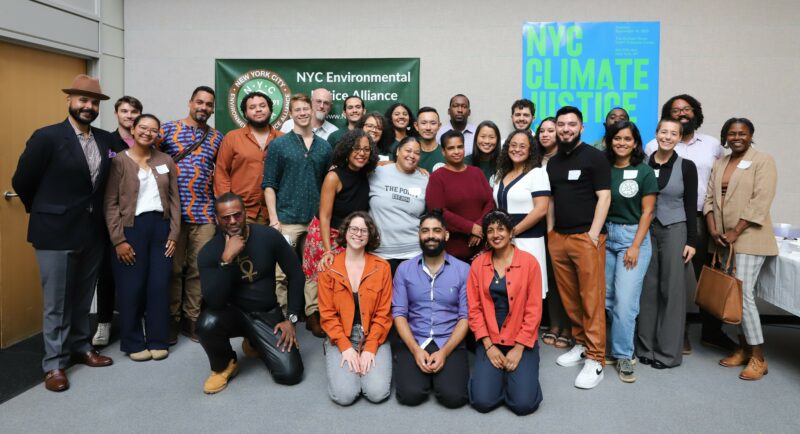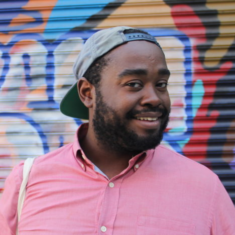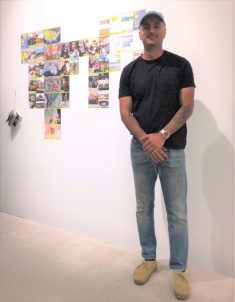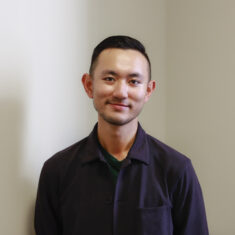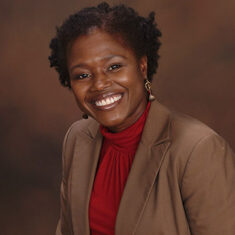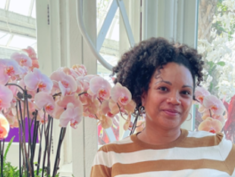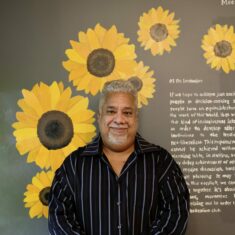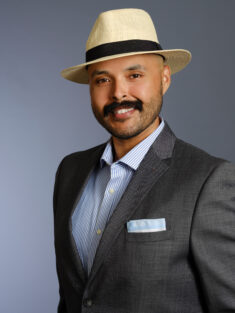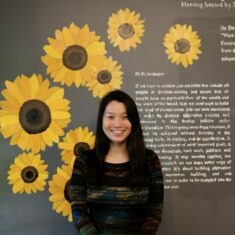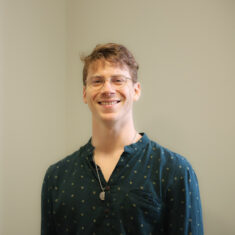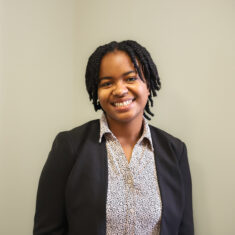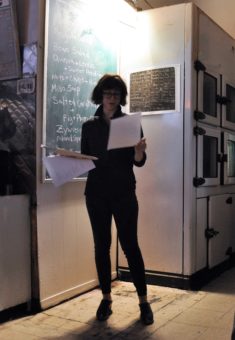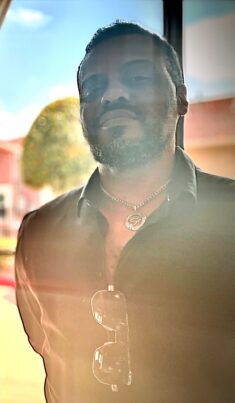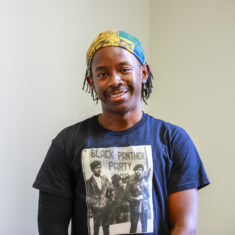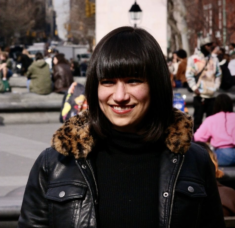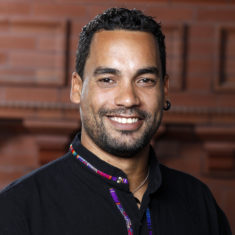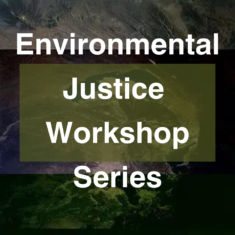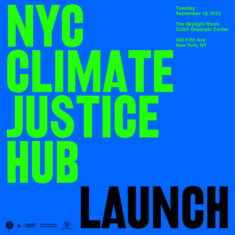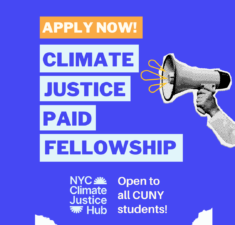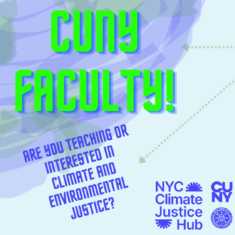About the NYC Climate Justice Hub
Launched in September 2023, the NYC Climate Justice Hub is a partnership between the City University of New York (CUNY)—the nation’s largest public urban university—and the NYC Environmental Justice Alliance (NYC-EJA)—a coalition of grassroots organizations who have led the fight for climate justice in NYC since 1991. By uniting CUNY and NYC-EJA, the Hub strengthens and fortifies just transition efforts led by frontline communities of color across NYC.
The Hub’s mission is to support NYC-EJA’s efforts to advance climate justice for New York City’s underserved, working-class Black and Brown communities. The Hub accomplishes this through the creation and the activation of new and existing trans-disciplinary systems and cross-sectoral networks that ensure CUNY robustly supports NYC-EJA—and the coalition of organizations and campaigns it brings together—in their efforts to accelerate “just transitions” in NYC. Through the creation of research teams, educational platforms, and a leadership development “vine,” the Hub prepares a generation of CUNY students to enter the workforce as climate leaders, operationalizes climate justice infrastructure at CUNY, and advances NYC-EJA’s transformative research agenda.
The NYC Climate Justice Hub is the largest of several “hubs” that have been created around the nation through a series of generous grants from the Waverley Street Foundation. This initiative supports minority-serving universities to work with place-based environmental justice organizations to advance the interests and aspirations of frontline communities most impacted by climate change. The current grant under which the NYC Climate Justice Hub is operating is for a 2-year pilot (2023-2025), with opportunities for future funding.
ICYMI: Elizabeth Yeampierre's speech at the HUB's Launch
Elizabeth Yeampierre is the executive director at UPROSE, located in Sunset Park, Brooklyn and one of the six NYC-EJA member organizations participating in the NYC Climate Justice Hub. She addresses elected officials, members of the press, climate justice researchers and academics, and environmental justice advocates during the NYC Climate Justice Hub Launch on September 19, 2023 about the importance of “shared power” in the fight for climate justice. Video by Marvic Paulo, captioned and edited by Charlie Overton and Pierina Pighi Bel.
Get involved!
Be the first to know about what is happening at the Hub by signing up for our monthly newsletter! It will come out soon!
Also, if you are interested in participating or collaborating in our programs or events or have a suggestion, we want to hear from you! Fill out our General Interest Form and share your ideas with us.
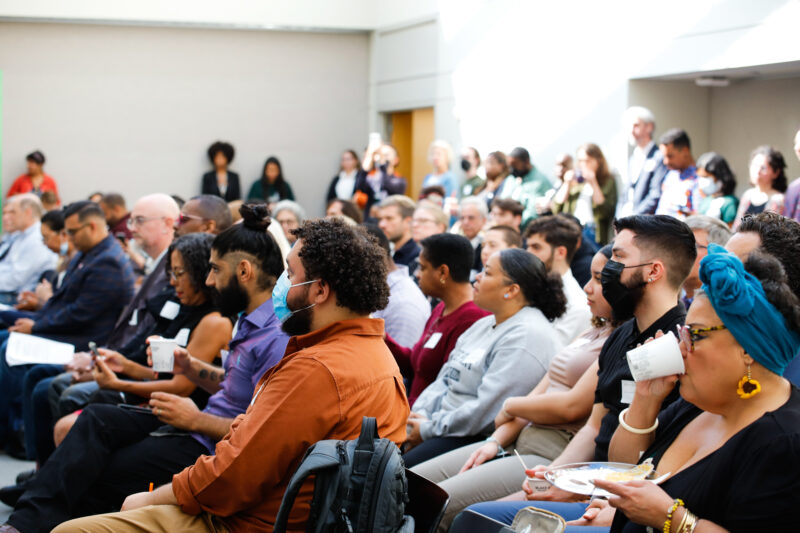
Programs and Initiatives
Through the NYC Climate Justice Hub, resources at CUNY are allocated into three core programs that serve the climate justice campaigns and priorities communicated by NYC-EJA and six of their participating member organizations.
Research Program
Each of the six participating NYC-EJA member groups is paired with a research team coordinated by CUNY faculty and students and supported by the Hub. The teams conduct research on behalf of an assigned NYC-EJA organization partner towards that organization’s campaign goals and priorities. Additional Research Teams also support NYC-EJA city and state wide campaigns such as CAMP-EJ and NY Renews.
- Research Teams Coordinators: Mike Menser (Brooklyn College) & Jazmyn Blackburn (CUNY Graduate Center)
- Graduate Student Specialist: Paul Oder (John Jay College for Criminal Justice)
- Participating Faculty:
- Sherry Ryan (Baruch College)
- Ryan Russo (Hunter College)
- Ahmed Mohamed (City College of New York)
- Nevin Cohen (Graduate School of Public Health)
- Juliana Maantay (Lehman College)
- Daniel Shtob (Graduate Center)
- John Krinsky (City College of New York)
- Elia Machado (Lehman College)
- Prathap Ramamurthy (City College of New York)
- Craig Willingham (Urban Food Policy Institute)
- Brett Branco (Brooklyn College)
- Yana Kucheva (City College of New York)
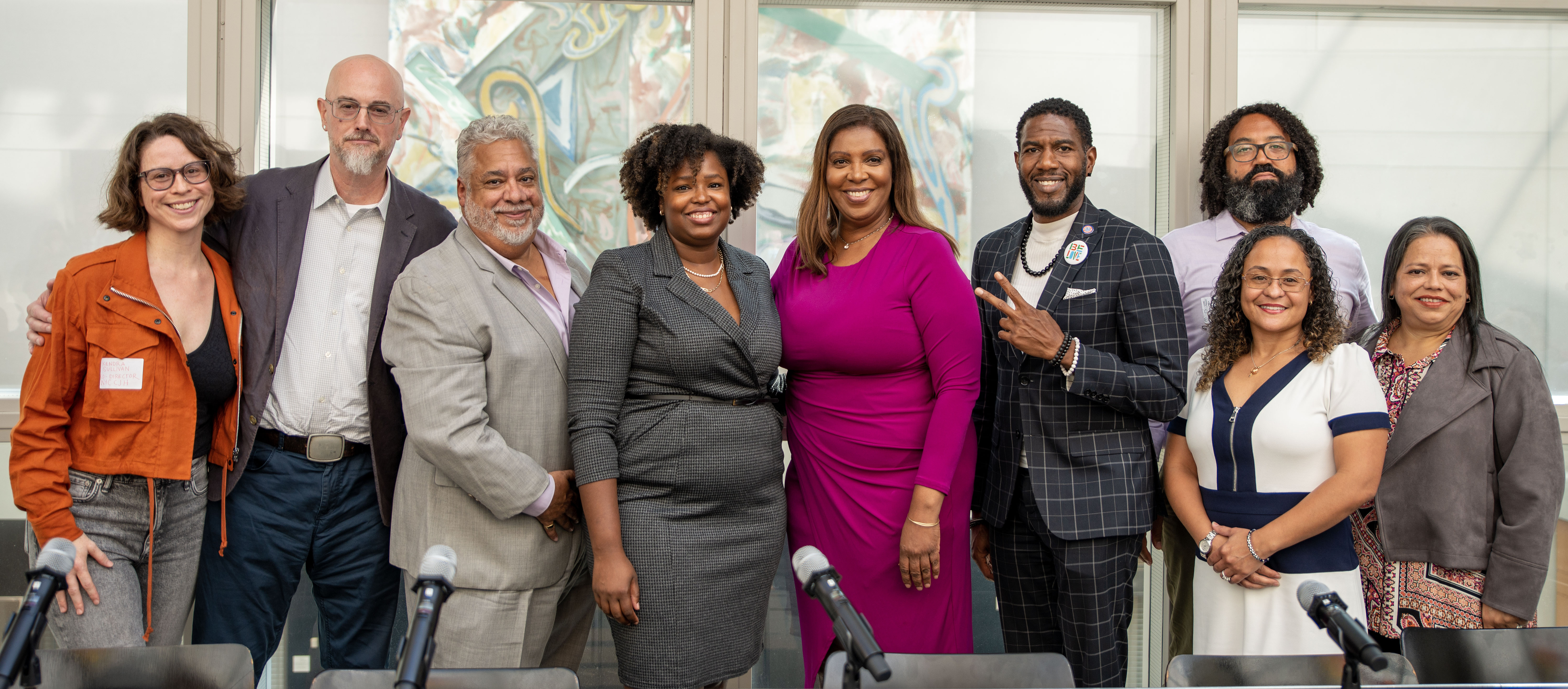
- Research Projects:
El Puente is studying the detrimental impacts of active truck routes and heavy automobile traffic reliant on the Williamsburg Bridge and Brooklyn Queens Expressway (BQE). The research will result in a comprehensive report outlining proposed changes to street designs and modal networks that could be developed for implementation by NYCDOT and would improve safety, livability, and quality of life for the Los Sures community. The key emphasis of this report will focus on mitigation measures and alternatives to existing truck routes, addressing daily traffic congestion within Los Sures and along the relevant portion of the BQE.
An extension of this project, concerned with the mitigation of the dense transportation infrastructure within Los Sures, is the BQGreen project. An average of 110,000 cars travel through the Southside via the BQE daily, emitting approximately 20,000 pounds of pollutants per day. As a result, Southside has amongst the highest asthma rates in the city. The BQGreen initiative would reduce air and water pollution, and reduce the instances of asthma and other health-related issues caused by air pollution from the massive volume of commercial and noncommercial vehicles that pass through the community.
BQGreen is the community-driven initiative to deck the open portion of the BQE that dips into the community with park space. BQGreen will create a “park out of thin air” by integrating Marcy Green and Rodney Park, two existing parks that are currently adjacent to the expressway. The completion of the traffic study will help inform the beginnings of other research looking into how the decking and closure of certain truck routes would alter traffic behavior in the surrounding community.
The Point CDC is embarking on two core projects to improve air quality, health outcomes, and cooperative infrastructure in Hunts Point, South Bronx. The first project explores community energy infrastructure (community owned solar, microgrid, and battery storage) with a focus on lowering energy costs for Hunts Point residents and funding for future infrastructure. This connects to The Point’s broader resilience initiatives, such as the Hunts Point Community Network (HPCN), which provides free wifi for residents and local businesses, allowing for greater accessibility to the Internet and connectivity within the community before, during, and after extreme weather events and other disasters. The project will analyze how membership and subscribership to community solar works, particularly how The Point as a non-profit would be able to build out a community governance structure to oversee these operations. The second project aims to implement a process for identifying underutilized land to use for multi-site community solar in Hunts Point. This will expand on The Point’s solar work as the community partner for The Bronx is Breathing, an initiative that includes building an electric charging station, solar canopies, and establishing an electric truck cooperative located on a former brownfield in the food distribution center.
UPROSE's key research priorities are related to The GRID 2.0 report. The Green Resilient Industrial District (GRID) 2.0 is a transformative economic development strategy designed for Sunset Park, offering a comprehensive plan for the next twelve years. Encompassing 28 updated objectives, this plan aims to facilitate a just transition within Sunset Park by 2035. The GRID 2.0 envisions revisiting and updating strategies by 2035, aligning with NYC’s goal of achieving total carbon neutrality by 2050. To implement the GRID 2.0, UPROSE has strategically selected two initial action items that move the 28 objectives forward. Firstly, this partnership will conduct a meticulous real estate mapping initiative analyzing purchases along the Sunset Park waterfront, aiming to optimize land use and infrastructure for sustainable development. This action item aims to answer, "What can we discover about recent trends in real estate sales and related activities that will help inform potential future actions?” In order to answer this question, the research team is creating a dynamic web map with real-time data profiling Sunset Park properties. Secondly, this partnership will continue research on food sovereignty in the neighborhood by analyzing possible connections to upstate farmers with a local food hub in Sunset Park. This action item aims to answer 1) How can we identify sites in Sunset Park to cultivate food sovereignty? 2) What opportunities and barriers exist to setting up a food distribution hub in the industrial waterfront? 3) How can food sovereignty in Sunset Park help diversify food resources and improve food security in the city?
We Stay/Nos Quedamos is creating a popular education curriculum that bridges environmental justice and housing issues. Over 30 years ago, We Stay/Nos Quedamos (NQ) was born out of a community organizing effort to resist forced displacement and propose an alternative urban renewal plan in Melrose Commons. Today, we recognize that our work is far from finished. Our goal with this project is to create an environmental justice and housing justice organizing curriculum rooted in the history of the South Bronx that bridges environmental justice and housing justice, equipping the We Stay/Nos Quedamos Environmental Justice Youth Team with the tools to learn, educate, empower, and organize with and for their communities. This curriculum includes scheduled organizing training and place-based, bilingual, and intergenerational workshops on understanding and mapping environmental justice and housing issues facing Melrose and the South Bronx. Module topics include the following: We Stay/Nos Quedamos in the History of the South Bronx; Intro to Climate Justice and Environmental Justice; Intro to Housing Justice and Anti-Displacement Organizing; Air Quality, Asthma, and Transportation Justice; Heat Burden and Green Space/Waterfront Access; Food Justice, Urban Food Sovereignty, and Community Gardens; Energy Justice, Renewable Energy Sources, and the “Just Transition”; Sanitation and Waste Equity Campaigns, Recycling and Compost; Flooding and Stormwater Management in New York City; and The Importance of Storytelling, Organizing, and Advocacy for the Future of the Bronx.
Brooklyn Movement Center is researching how Central Brooklyn’s physical environment undermines community sustainability and contributes to disproportionate premature death and illness among Black residents. Central Brooklyn is defined as Bed-Stuy, Crown Heights, and the surrounding neighborhoods. These communities have been marked by generations of disinvestment, unique environmental challenges, and currently a level of displacement that not only threatens the health of the community, but its very ability to stay in place. Past studies conducted on the environmental determinants of health, heat island effects, and energy inequity in Central Brooklyn and their results have not made it to the communities studied. With this in mind, the objective of BMC’s research is to (1) engage the Central Brooklyn community in the research process, (2) identify solutions and put strategies into practice, (3) create opportunities for policy advocacy and change. The research is being developed alongside Black Central Brooklynites to create and practice strategies that employ a practical application of scientific studies and create policy advocacy both informed by science and lived experience that touch on the following priority areas: environmental/social determinants of health, implications of extreme heat, and energy democracy–micro-grid and strategies toward community control.
GOLES is creating and deploying a survey to assess community perception and understanding of environmental justice, climate justice, and waterfront resiliency in the Lower East Side (LES) of Manhattan. The area has already seen the impacts of climate change, including increased temperatures and more frequent and severe storms. The combination of environmental and social factors in the area renders it especially susceptible to climate change due to several challenges, including the presence of housing built on former marshland, deteriorating infrastructure, and inconsistent utility services due to landlord neglect. The survey will gauge the community's understanding of two major waterfront resiliency projects: the East Side Coastal Resiliency (ESCR) project and the Brooklyn Bridge Montgomery Coastal Resilience (BMCR) project. It will also ask residents how current development in the neighborhood affects their well-being and will assess the community's awareness of the New York State (NYS) Green Amendment, which guarantees that every person in NYS "shall have a right to clean air and water, and a healthful environment." The results of the survey will culminate into a Community Resiliency Plan and identify 10-12 climate/environmental justice campaigns to activate with LES residents. The final deliverable will be a policy report that will summarize the key findings of the survey, present the significance of the findings from a climate justice and environmental justice perspective, and present actionable steps that policymakers can take to address environmental justice issues in the Lower East Side.
Classes and Curriculum Program
CUNY faculty at any level (part-time, full-time, graduate, undergraduate, etc.) who are teaching courses with an environmental or climate justice focus—or are aiming to develop such curriculum—are invited to meet with each other, share syllabi, and connect to climate justice content and NYC-EJA organizations and their campaigns.
- Curriculum Team Coordinator: Kobie Colemon (Brooklyn College)
- Graduate Student Specialist: Dinorah Hudson (CUNY Graduate Center)
- Participating Faculty:
- Shelly Eversley (Baruch College)
- Eileen Markey (Lehman College)
- Lauren Wang (City College of New York)
- Ryan O'loughlin (Queens College)
- Alice Baldwin-Jones (LaGuardia Community College)
- Mariposa Fernández (Lehman College, City College of New York)
- Kenneth Gould (Brooklyn College, Graduate Center)
- Nathan Hosannah (LaGuardia Community College)
- Bibi Calderaro (John Jay College of Criminal Justice)
- Ryan Mann-Hamilton (LaGuardia Community College)
- Denise Thompson (John Jay College of Criminal Justice)
- Michael Menser (Brooklyn College)
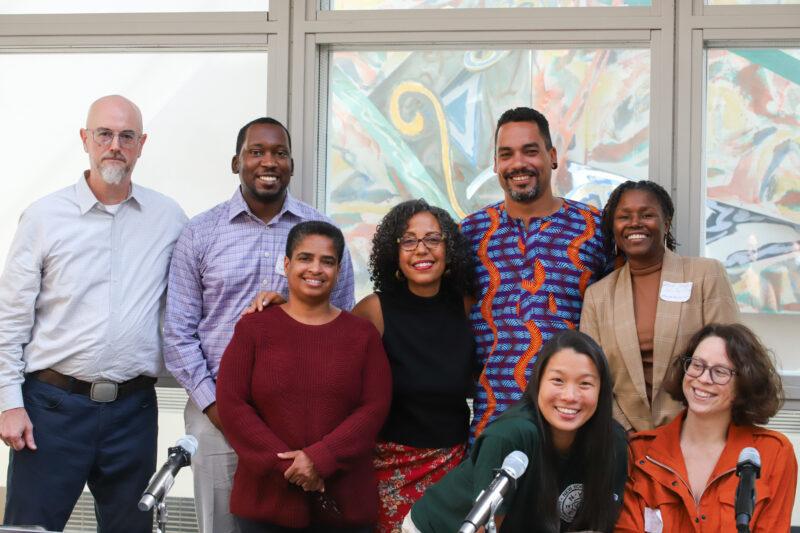
CUNY Climate Justice Academy and Ambassador Program
This program provides an emerging generation of climate justice leaders from across CUNY with the skills, networks, and opportunities they need to advance climate solutions through study, service-learning, professional development, research and advocacy projects, and campaign and policy development. By establishing a leadership vine that links CUNY students to community-based organizations in their own neighborhoods, the Climate Academy and Ambassador Program creates key access points for student engagement in just transitions. (Applications for the fellowship will open Spring 2024 and are available to undergraduate and graduate students enrolled at CUNY.)
- Fellowship Coordinator: TBD
- Graduate Student Specialist: Maithreyi Rajeshkumar (CUNY Graduate Center)
- Participating Faculty: TBD
For each of its three programs, the NYC Climate Justice Hub’s agenda is set by NYC-EJA and six of its member organizations.
Participating Partners

El Puente - Based out of Williamsburg and Bushwick for the past 41 years, El Puente bridges the worlds of health, education, and the arts with activism and community empowerment. Initially founded to address youth violence, El Puente’s work is broad – spanning the creation of the first human rights high school in the US to co-founding NYC-EJA, the Latino Commission on AIDS, and the Vieques Island protests in Puerto Rico.

The Point CDC - Based out of Hunts Point for the past 29 years, The Point’s programming falls under three distinct headings: Youth Programming, Arts and Culture, and Community Development Youth Programming is through the lens of environmental justice, youth development and arts and culture to create a more livable community and generate economic opportunity Arts and Culture is dedicated to the cultivation/preservation of South Bronx culture and making the arts economically and geographically accessible to Hunts Point residents Community Development seeks to support the academic, artistic and positive social development of young people in Hunts Point and engage them as leaders in community development.

Good Old Lower East Side (GOLES) - GOLES is a neighborhood housing and preservation organization that has served the Lower East Side of Manhattan since 1977. GOLES’ long-term goals are to (1) build the power of low-income residents to address displacement and gentrification; (2) preserve and expand the low-income housing stock; (3) assert community self-determination over the use of public space; and (4) ensure a clean and healthy environment where people live, work, and play.

Brooklyn Movement Center - Based out of Bedford-Stuyvesant for the past 12 years, BMC works to build power and self-determination for Bedford-Stuyvesant and Crown Heights’ Black communities. BMC’s main issues of focus include police accountability and community safety, food sovereignty, environmental justice, anti-gentrification media production, electoral justice, and tenant organizing.

We Stay/Nos Quedamos - Based out of the South Bronx for almost 30 years, WE STAY/Nos Quedamos is dedicated to substantively improving the health and well-being of the surrounding Melrose community and greater South Bronx region. Partnerships (in addition to NYC-EJA) include the South Bronx River Watershed Alliance, Our City Our Homes, and the Bronx Climate Justice Initiative. WE STAY/Nos Quedamos focuses on Advocacy through youth promotion and job development, financial literacy, and housing/tenant’s support with property management and on Environment – Sustainable Community Development through green building, brownfield remediation, and air quality-related initiatives.

UPROSE - Founded in 1966 and based in Sunset Park, UPROSE is determined to see a Just Transition, a move away from the extraction economy and towards climate solutions that put frontline communities in positions of leadership. UPROSE’s current campaigns focus on Climate Justice, Energy Democracy, and Anti-Displacement (in addition to work related to Transportation Justice, Youth Organizing, Community & Industrial Business Resiliency, Small Business Resiliency, and 100% Renewable Energy).
CUNY campuses work with these leading community organizations and the neighborhoods they represent. Four campuses in particular are the foundation of the collaboration:

Laguardia Community College - With the motto, “Dare to Do More,” Laguardia Community College’s mission is to educate and graduate one of the most diverse student populations in the country to become critical thinkers and socially responsible citizens who help to shape a rapidly evolving society. Recently, LaGuardia Community College collaborated with Queens College to establish the Queens Climate Justice Fellows program to offer students the opportunity to learn about the intersection between both social justice and environmentalism, where the inequality of who is being impacted is also considered.

Brooklyn College - Brooklyn College is an integral part of the civic, urban, and artistic energy of New York and uses the entire city as a living classroom that broadens students’ understanding of the world around them. With its Urban Sustainability Program, the Science and Resilience Institute at Jamaica Bay, Brooklyn College is at the crux of building out interdisciplinary approaches to environmental science and social justice across its many departments.
CUNY Graduate Center - The Center for Humanities at the CUNY Graduate Center proudly hosts the NYC Climate Justice Hub. The Graduate Center also boasts several programs and departments offering insight into the complexity of the issues in climate justice. The Center, for example, also hosts the Advanced Science Research Center, the CUNY Climate Consortium (C3), and the Climate Solidarity initiative—among others.
John Jay College for Criminal Justice - Perhaps a seemingly unconventional candidate for radical climate justice frameworks, John Jay offers a powerful policy lens for investigating issues of climate justice—which, at their core, are issues of social justice. In recent years, the college has transformed significantly to build a robust environmental justice and climate justice curriculum, in addition to its traditional criminal justice focus. This includes a new minor offering in Sustainability and Environmental Justice and efforts to incorporate environmental justice courses into every major.
Get Involved!
Thank you for your interest in the NYC Climate Justice Hub! To learn more about the Hub or to get involved, please email [email protected].
This page will be updated regularly. Please check back frequently for more information, updates, opportunities, and announcements! Be the first to know about what is happening at the Hub by signing up for our monthly newsletter!
Glossary
Climate Justice focuses on the root causes of the climate crisis through an intersectional lens of racism, classism, capitalism, economic injustice, and environmental harm. Climate justice supports a Just Transition for communities and workers away from a fossil fuel economy and focuses on making the necessary systemic changes to address unequal burdens to our communities and to realign our economy with our natural systems. As a form of environmental justice, climate justice means that all species have the right to access and obtain the resources needed to have an equal chance of survival and freedom from discrimination. As a movement, climate justice advocates are working from the grassroots up to create real solutions for climate mitigation and adaptation that ensure the right of all people to live, learn, work, play, and pray in safe, healthy, and clean environments (A People’s Orientation to a Regenerative Economy).
Environmental justice is the international movement of low-income communities and communities of color standing in solidarity against hazardous environmental and infrastructure burdens of environmental amenities and equity confronting their communities. (NY Renews Climate and Environmental Justice Glossary)
Just transition refers to the sociopolitical and economic transformation that encompasses the shift to renewable energy. A just transition prioritizes the process and goals of a move away from fossil fuels, emphasizing grassroots democratic decision-making. A just transition requires addressing intersectional systems of oppression and uplifts communities and people who have been subject to environmental racism and injustice. A just transition also involves a return of resource control (including land, water, and food systems) to the people, specifically Indigenous communities whose land has been stolen and exploited through energy extraction for centuries. A just transition also supports workers transitioning from employment in fossil fuel industries to renewable energy via job retraining, direct support, and more. (NY Renews Climate and Environmental Justice Glossary)
